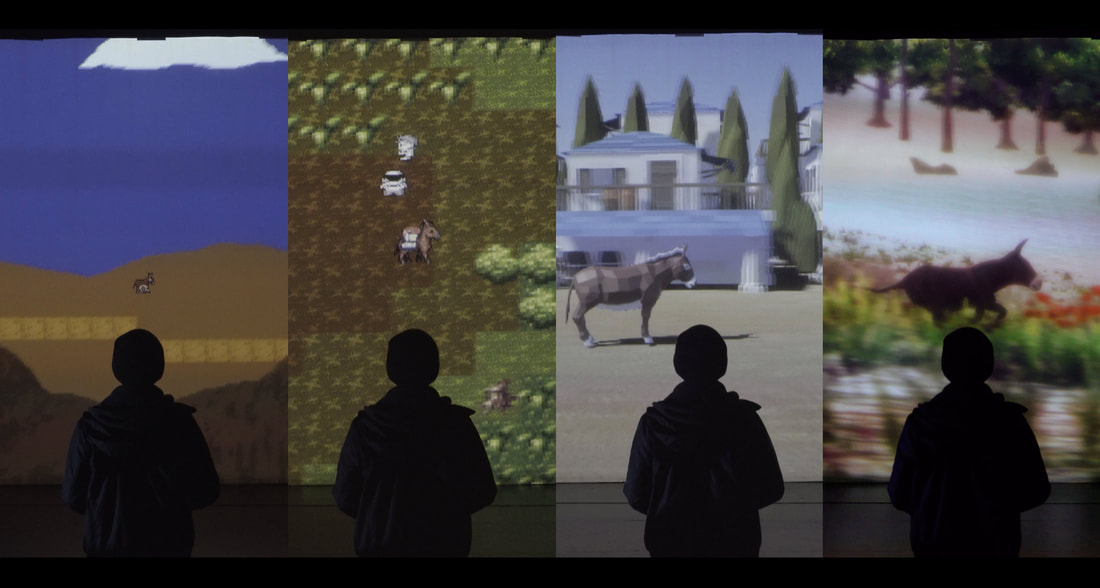asses.masses: a collective audience-player blog (FOLDA 2023)
|
I enjoyed asses.masses tremendously. In addition to all the wonderful things I could say about the game (thought-provoking, witty, beautiful, etc), I was struck by how lovely it was to share this space with my fellow audience members in a way that I hadn’t experienced before. I haven’t had much opportunity to experience any durational/extremely long pieces so I wasn’t sure how much I could enjoy being in a small-ish room with a group of mostly strangers for the equivalent of a full workday. I was pleasantly surprised by my positive interactions with other folks in the room, so when Jenn and Mo asked me to share some of my thoughts on my experience seeing the show, that is what I’ve chosen to focus on.
I chatted with a few friends who were at the show about it after the fact and a few interesting thoughts cropped up– one of them was the pressure the person playing felt. From the audience perspective, I was getting a warm and supportive energy from the rest of the audience; and yet, my friends who both went up to the controller agreed that the pressure to represent the group and try to please everyone was huge. My friend Cristian “being up there was some of the worst anxiety I’ve ever experienced…. the herd behind you, it scares you… I felt like I had to make the choices people wanted.” Sending an audience member up to that podium is a sign of trust, and that faith creates a sense of responsibility to the “herd” that is extremely affective for the audience player. To step up to the front and agree to make decisions on behalf of the group is a brave thing. Still folks seemed to get bolder over the course of the show’s duration and more went up as the show neared its conclusion. It doesn’t take that long to build a sense of community, and as a collective we quite quickly set a tone where folks felt comfortable shouting out suggestions and tips to the player at the front. They may have stepped out of the audience physically but they are still one of our own. Even though the controller is in their hands, we are working together. Being an approximately 7 and a half hour show, the folks that were willing to purchase tickets and commit to it were more than likely going to be video game enthusiasts; these were the folks who were able to immediately pick up on the references to and jokes about classic video games. And yet, there were still clearly a number of novices there who were having a blast. Our audience struck a delicate and, in my opinion, quite effective balance between allowing the player to explore and make mistakes and offering gentle suggestions for progressing the plot. My friends and I also chatted extensively about whether the show was theatre, or a video game (or both!). We spent a while discussing what makes something a ‘good’ game vs. a ‘good’ theatre piece. One of my friends said that it was a much better theatre piece than a video game, and the other said “I would call an apple a good fruit but not a good orange. It’s not trying to be a video game.” Once a show, as participatory theatre often does, integrates systems and elements from other styles and genres of performance by what metric are we to judge its supposed merit? Can we? asses.masses uses the form of the video game to drive home its themes; there’s been years of work put into creating this playground for the audience to test out, but we ultimately are in control of where the performance goes. The code of the game and the dialogue options we are given are the closest thing we have to a script. Just like many traditional theatre shows, we have intermissions. Then again, they are structured more like bathroom/dinner breaks during a movie marathon. The audience got to choose how long these lasted, and so it allowed for another moment of collective bonding as folks usually waited until at least the majority of people agreed that they were ready to continue. Even outside of the context of the game, we have chosen to make these decisions collectively. For several of the intermissions, someone was given the task of letting the stragglers in the lobby know we would be restarting in a few minutes. We continue to rely on our good old Western theatre etiquette practices to ensure that we get along and can work together with all our fellow audience members. Just as asses.masses uses the structure of video games to make theatre, so too do we as audience members use our familiar theatre structure to try and facilitate a positive experience for everyone involved.
4 Comments
|

 RSS Feed
RSS Feed
